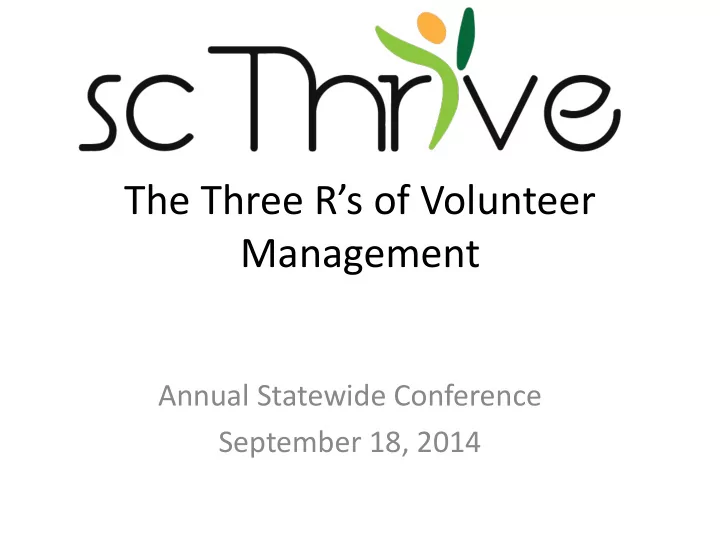

The Three R’s of Volunteer Management Annual Statewide Conference September 18, 2014
The Three R’s Good programs depend on developing a strategy that focuses on: of Volunteer Management: Recruitment Retention Recognition Recruitment, Rete ntion R’s of Volunteer Management: Recruitment, Retention & Recognition
"Volunteers are somebody! Somebody who cares, Somebody who devotes time without pay, Somebody who praises all, large or small and somebody who has a common bond with others to make things better ."
Before you start recruiting
… - Defining Philosophy and Goals Preparing the Environment Identifying Roles and Division of Labor Building Program Infrastructure
Recruitment
Simple Truth How You recruit--- Determines Who Will Respond
Use the Four W’s Take time to think and plan your recruitment process: What are your needs? Who is your target populations? Where do you find these people? When do I need volunteers?
Last W — why do people volunteer Give back to their community Make a difference Utilize their talents Meet people
Now start recruiting Utilize your current volunteers They are the best advertisement or your worse resource Talk about your program and needs Never miss an opportunity Think outside the “box” Develop Team approach Encourage a few volunteers to be your recruiters Highlight your volunteers and their stories Local newsletters, papers and other resources
Now you have your volunteers Short attention span Want to get started Interview potential volunteers They get to know you and you them Complete an application and do background check Be specific on what you expect Define roles and expectations Provide appropriate training Give them the tools to be successful
Retention
Begins at Recruitment!
Why Do Volunteer Leave? Did not feel needed When they came to work — nothing to do Did not utilize their skills Given tasks not appropriate — either too easy or too difficult Did not feel appreciated Thank you goes a long way Did not have the tools to be successful
Tools for Volunteers Specific roles and responsibilities Clear expectations Training There is only one thing worse than training your volunteers and having them leave - and that's not training them, and having them stay. Open, honest and continuing communication Appreciation
Basic Rules of Retention Don’t waste volunteers time Nothing to do Staff not available or prepared No equipment or necessary resources Client scheduled was unavailable Spend time waiting for assignments or instructions
Basic Rules for Retention Match the volunteer skills with assignments Develop the work plan with their input Think outside the box on assigning job Observe the volunteer and reassign as you see their strengths
Basic Rules for Retention Make the volunteer feel appreciated Simple and often Best words — Thank You!
Recognition
How Do You Recognize Volunteers Validate Think about your volunteers Vary your approach
Validation Show that you are aware of their work I admire your work ethic I am impressed at how pleasant you are after a hard day I love your sense of humor You are a great problem solver I like your calm manner in difficult situations I love your caring personality "No act of kindness, no matter how small, is ever wasted" -- Aesop
Matching Recognition 3 categories of recognition Varying levels of intensity (daily, intermediate and major) Motivation of the volunteers Achievement, affiliation or power Type of volunteering
Level of Intensity Daily recognition Using the everlasting two words — Thank You! Recognizing a good job Inviting volunteer for coffee or soda Asking their opinion/input Using it if possible Greeting volunteers Bragging about them when they can hear
Level of Intensity Intermediate recognition Taking volunteer to lunch Putting volunteers on important committees/task forces Having volunteers help train new volunteers Distributing certificates of appreciation Including volunteer work in newsletters, bulletins, emails, etc.
Level of Intensity Major recognition Giving special items: mugs, T shirts, pins, notebooks Providing a special section of publications for volunteer contributions Hosting an Annual Volunteer recognition event — April is Volunteer Month Purchasing advertisement in local media recognizing volunteers
Motivational Orientation Power-oriented volunteers Recognition announced in broad-based coverage Volunteers are recognized by the organization’s leadership Include volunteers in higher level decision making opportunities
Type of Volunteering Long-term Recognition through increased involvement and responsibilities Recognition of annual anniversary of service Recognition by upper management of organization
Type of Volunteering Short Term Recognition given immediately for individuals and work groups On the bulletin board, marquee or banner welcoming volunteers Recognition with a simple take-away Certificate of appreciation, photograph, etc. Recognition of volunteer effort through letter to boss, home agency or others
Final Thoughts on Recognition An “ideal” recognition system is one that may include a mixture of different elements to have something for every volunteer Do not rely solely on the standard “annual” volunteer breakfast/luncheon/reception recognition program Consult volunteers when planning your year-round calendar of recognition events
Don't ever question the value of volunteers. Noah's Ark was built by volunteers; the Titanic was built by professionals.
Questions? Contact Pat Robson pvr0417@aol.com 843-237-8859
Recommend
More recommend